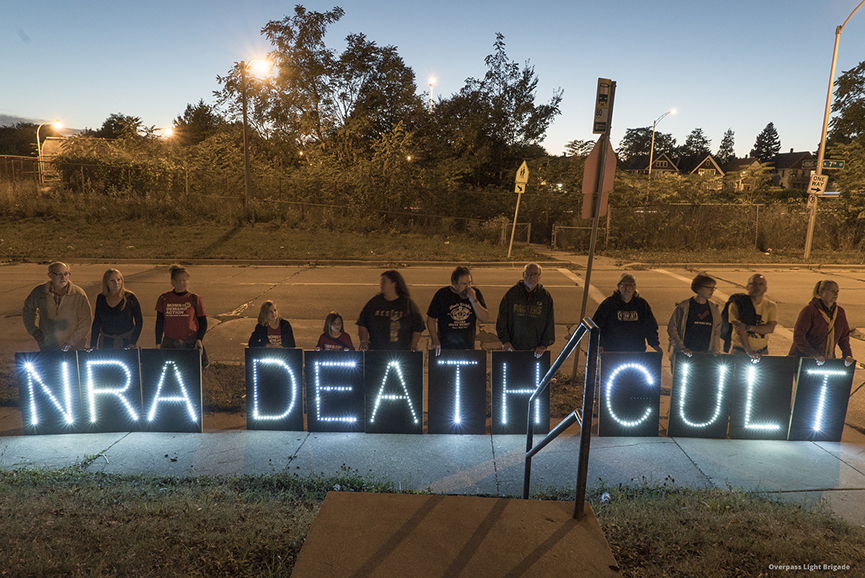Response in the U.S. to the latest school massacre (an astounding phrase itself) has been riveting.
It’s those kids speaking out. No matter what despair you feel, it’s too cruel to give up on those arriving from the future. How does corruption always eventually set in? Is it just age and experience chipping away? Is it the influence of success itself — all that screen time and praise?
But when the gun question is involved, I also find myself asking: are the most vocal opponents of gun control speaking in good faith or bad? Generally, when people voice despicable (to me) views, I’d prefer thinking they believe what they say, and that they’d pass a lie-detector test for sincerity. So they’d have convinced themselves of the B.S., before passing it to others. There’s a tortuous philosophical category covering this called false consciousness.
For the main voices against gun control, though, I don’t believe it. They speak in bad faith. They know they’re lying as they talk. The evidence against them is simply too strong.
No place on Earth has the gun issues the U.S. has. Australia had one school massacre, brought in controls and, as people kept saying at CNN’s Wednesday Town Hall, it was Never Again. The U.S. could do it. What the gun claque really means is: We’d rather lose our kids than our guns.
That’s hard for people elsewhere to believe. We’d rather think they’re honest but misguided. But the U.S. eludes us. We don’t have a “right to bear arms.” There, gun culture runs as deeply as race, and they’re related, as Michael Moore brilliantly suggested in Bowling for Columbine.
The white majority lives in perpetual fear of retaliation. For what? The U.S. began with a continental genocide against Indigenous peoples and never resolved its brutal treatment of slaves brought there in chains. Many Americans carry on with a shudder, looking over their shoulders. Not literally. But they cling in fear to their guns.
There are also doubtless Americans who believe the NRA nostrums — guns don’t kill people, people kill people; when guns are outlawed, only outlaws will have guns, etc. Yet, the simplest common sense refutes this: it’s only the U.S. that has these problems; those formulas apply nowhere else, so why would they apply to the U.S.? But what you have to factor in is how provincial the place is.
In Dog Day Afternoon, one of the hostage-takers, Sal, is asked if there’s a special country he’d like to be flown to. He says Wyoming. “Sal,” says his partner, “Wyoming’s not a country.” It’s touching and humane. But Sal probably doesn’t even get that there’s a difference between a state and a country. He’s had a bad education but an American one.
When you learn that you live in the best country in the history of the world, it’s a short step to thinking it’s the only one. In either case, why would you bother drawing lessons from lesser peoples?
Each time one of these searing events occurs, I find myself hoping, like an idiot, that Americans whose lives have been shattered will draw connections to others in the world whose own lives have been blasted by U.S. acts — and that the effect will be to augment general compassion.
That kids in Florida, for instance, will think of kids in Iraq and Syria after what is now generations of U.S. military interventions.
I felt that way, stupidly, after 9-11. The U.S., which had never been struck by terror from abroad, would start comprehending how it’s viewed elsewhere. Why don’t Americans ever learn from these things? It’s a price they pay for their “exceptionalism”– they have nothing to learn from others.
Sorry for the unrelieved gloom. I prefer to find a glimmer of hope, which would be those kids. I suppose I should add that I lived there for 10 years and loved it. I felt more at home than I ever had in Toronto.
But Freud, who went to the U.S. in 1909 to deliver his “Introductory Lectures on Psychoanalysis,” told his biographer afterwards, “America is the most grandiose experiment the world has seen. But, I am afraid, it is not going to be a success.”It’s “a mistake,” he added. “A gigantic mistake but a mistake.”
If there’s a shred of hope there, it would be his grim, unflinching humour.
This column originally appeared in The Toronto Star.
Image: Joe Brusky/Flickr
Like this article? Please chip in to keep stories like these coming.





